|
|
|
Sort Order |
|
|
|
Items / Page
|
|
|
|
|
|
|
| Srl | Item |
| 1 |
ID:
178182
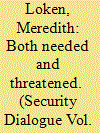

|
|
|
|
|
| Summary/Abstract |
Because women are assumed to be nonviolent, their participation in militant groups can humanize organizations and legitimize rebellion. But gender beliefs are deeply engrained, and consequently women’s involvement can also generate resistance. This article explores how militants navigate this tension through their political visuals, specifically analyzing images of ‘armed mothers’ across six diverse conflicts. Leveraging life-giving as the ‘natural’ role for women, these images signal violent disruption of everyday life and authorize political violence in response. But they also stress the temporariness of gender-role expansion, promising and preserving a ‘return to normal’. Militant groups contextualize, justify, and humanize violent struggle through these images even in cases where women rarely participate on the front lines.
|
|
|
|
|
|
|
|
|
|
|
|
|
|
|
|
| 2 |
ID:
163272
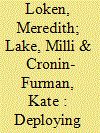

|
|
|
|
|
| Summary/Abstract |
Why do governments and militaries publicly condemn and prosecute particular forms of abuse? This article explores the Sri Lankan government's decision to promote limited legal accountability for state-perpetrated rape committed in a country otherwise renowned for widespread impunity. We argue that rather than representing a turn against impunity, the symbolic stance against conflict-related sexual violence in a small number of high-profile cases served an explicitly politico-military agenda. The state deployed legal accountability in specific cases to garner political legitimacy among key domestic audiences. The Sri Lankan government drew on the symbolism of female victimhood to mobilize support at a time when support for military counterinsurgency was waning. We show that governments can uniquely instrumentalize sexual violence cases to establish moral authority and territorial legitimacy. Through an examination of the domestic legal response to state-perpetrated human rights abuses, we illustrate the many ways in which women's bodies—and the law—can be mobilized in war to serve military ends.
|
|
|
|
|
|
|
|
|
|
|
|
|
|
|
|
| 3 |
ID:
157743
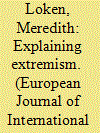

|
|
|
|
|
| Summary/Abstract |
Women participate extensively in armed, Islamist struggle. In recent years, foreign women have travelled from the West to join Daesh. Their participation perplexes policymakers, government officials, and researchers who call attention to the group’s gendered regulation, violence, and widespread use of rape. Consequently, observers often argue that women are deceived by the organisation or seduced by the promise of romance. This suggests that women would not, under rational circumstances, choose to join the group. In this article, we address two resultant questions: why do Western women join Daesh? Are their motivations distinct from other Islamist recruits? Using an original dataset of social media activity from 17 Western female recruits between 2011–15, we conclude that women are primarily driven by religious ideology that adopts an expressly gendered frame. We find that feelings of isolation and disaffection also drive migration. We suggest that female foreign recruits are not unique in their motivations and share many similarities with male fighters and women in other Islamist organisations. This research has valuable implications for security studies and counterterrorism, which tend to treat extremist women as unique. Female recruits should be taken seriously as insurgents intent on establishing an Islamic caliphate.
|
|
|
|
|
|
|
|
|
|
|
|
|
|
|
|
| 4 |
ID:
196034


|
|
|
|
|
| Summary/Abstract |
This article introduces the Women’s Activities in Armed Rebellion (WAAR) project, a multi-methods project that includes a cross-sectional dataset of women’s participation in more than 370 organizations fighting in civil conflicts between 1946 and 2015. The dataset features 22 measures of women’s participation in rebel organizations: it includes prevalence and presence measures of women’s participation in combat, non-combat and leadership roles; details on all-female units within groups (and their primary focus – combat or support activities); and presence measures for types of support work (disaggregated into clandestine work, outreach to civilian populations and logistical support) and types of leadership activities (military or non-military) that women contribute. The WAAR project also includes a detailed, qualitative assessment of women’s involvement in each organization, comprising an approximately 360-page handbook of female rebel participation in the post-WWII period. This article describes the WAAR project and suggests avenues for future research leveraging these data.
|
|
|
|
|
|
|
|
|
|
|
|
|
|
|
|
| 5 |
ID:
186759
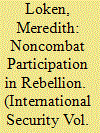

|
|
|
|
|
| Summary/Abstract |
Research on women's participation in rebel organizations often focuses on “frontline” fighters. But there is a dearth of scholarship about noncombat roles in rebel groups. This is surprising because scholarship on gender and rebellion suggests that women's involvement in rebel governance, publicity, and mobilization can have positive effects on civilian support for and participation in rebel organizations cross-nationally. Further, women often make up the critical infrastructure that maintains rebellion. A new conceptual typology of participation in rebellion identifies four dimensions along which individuals are involved in noncombat labor: logistics, outreach, governance, and community management. These duties are gendered in ways that make women's experiences and opportunities unique and, often, uniquely advantageous for rebel organizations. Women take on complex roles within rebellion, including myriad tasks and duties that rebels perform in conjunction with or in lieu of combat labor. An in-depth analysis of women's noncombat participation in the Provisional Irish Republican Army in Northern Ireland demonstrates this typology's purpose and promise. Attention to noncombat labor enables a more comprehensive analysis of rebel groups and of civil wars. Studying these activities through this framework expands our understanding of rebellion as a system of actors and behaviors that extends beyond fighting. Future scholarship may use this typology to explain variation in types of women's participation or the outcomes that they produce.
|
|
|
|
|
|
|
|
|
|
|
|
|
|
|
|
| 6 |
ID:
153937
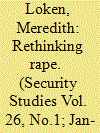

|
|
|
|
|
| Summary/Abstract |
There is widespread variation in scope, scale, and forms of rape across and within conflicts. One explanation focuses on the integration of women in armed groups. Scholars and international organizations posit that the inclusion of women in armed groups discourages wartime rape. They advocate women's increased participation to combat rape and other forms of civilian violence. Using an original dataset of women's involvement as combatants in civil wars from 1980 to 2009, I argue that the participation of female fighters has no significant impact in constraining an armed group's propensity to rape. Female combatants do not lessen rape because organizational factors, primarily culture, drive violence in armed factions and encourage conformity irrespective of individual characteristics. Advocating further militarization of women in an attempt to reduce conflict-related rape may be an ineffective policy prescription.
|
|
|
|
|
|
|
|
|
|
|
|
|
|
|
|
|
|
|
|
|